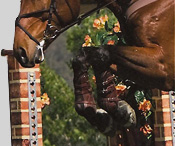



PARASITE CONTROL

Wage War on Equine Parasites
nternal parasites are silent killers. They can cause extensive internal damage, and you may not even realize your horses are heavily infected. At the very least, parasites can lower resistance, rob the horse of valuable nutrients, and cause gastrointestinal irritation and unthriftiness. At their worst, they can lead to colic, intestinal ruptures, and death.
Using deworming agents on a regular schedule in combination with good management procedures is critical to relieving your horse of most parasites. Since parasites are primarily transferred through manure, good management is key. In terms of management priorities, establishing a parasite control program is probably second only to supplying the horse with clean, plentiful water and high quality feed.
To get rid of parasites before they attack your horse, follow these suggestions from the American Association of Equine Practitioners (AAEP):
- Pick up and dispose of manure droppings in the pasture at least twice weekly.
- Mow and harrow pastures regularly to break up manure piles and expose parasite eggs and larvae to the elements.
- Rotate pastures by allowing other livestock, such as sheep or cattle, to graze them, thereby interrupting the life cycles of parasites.
- Group horses by age to reduce exposure to certain parasites and maximize the deworming program geared to that group.
- Keep the number of horses per acre to a minimum to prevent overgrazing and reduce the fecal contamination per acre.
- Use a feeder for hay and grain rather than feeding on the ground.
- Remove bot eggs quickly and regularly from the horse’s haircoat to prevent ingestion.
- Rotate deworming agents, not just brand names, to prevent chemical resistance.
- Consult your veterinarian to set up an effective and regular deworming schedule.
With the many safe, convenient products available today, establishing an effective deworming program is easy. Discuss a plan with your veterinarian and implement it without delay. A good parasite control program will go a long way toward maximizing your horse’s appearance, performance and comfort. The net result will be an animal that is as healthy on the inside as it appears on the outside.
For more information about waging war on equine parasites, ask your veterinarian for a copy of the “Parasite Control” client education brochure, provided by the AAEP in partnership with Educational Partner Bayer Animal Health. Information about equine parasites also can be found on www.myHorseMatters.com, the AAEP’s horse health Web site.
Reprinted with permission from the American Association of Equine Practitioners.
If you have any questions about this article or about how to eliminate your horse's parasite load please contact your veterinarian at 775-969-3495.
PO BOX 60730
RENO NV 89506
EMERGENCY (775) 742-2823 OFFICE (775) 969-3495
FAX (775) 969-3923






